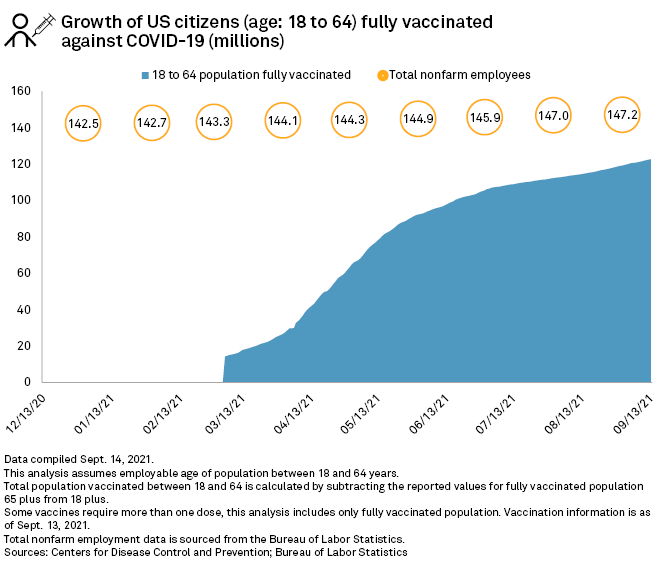S&P Global Offerings
Featured Topics
Featured Products
Events
S&P Global Offerings
Featured Topics
Featured Products
Events
S&P Global Offerings
Featured Topics
Featured Products
Events
Banking & Capital Markets
Economy & Finance
Energy Transition & Sustainability
Technology & Innovation
Podcasts & Newsletters
Banking & Capital Markets
Economy & Finance
Energy Transition & Sustainability
Technology & Innovation
Podcasts & Newsletters
S&P Global Offerings
Featured Topics
Featured Products
Events
21 Sep, 2021
By Charlsy Panzino, Morgan Frey, and Husain Rupawala

Delta Air Lines is one of a growing number of companies requiring COVID-19 vaccines for workers.
Vaccine mandates in the U.S. could help boost the job market just as employment gains are starting to slow down, according to economists.
While the healthcare industry has long required vaccines for workers, the mandates are spreading to other sectors. Companies including Alphabet Inc., Delta Air Lines Inc. and Citigroup Inc. now require certain employees to receive a COVID-19 vaccine, and these self-imposed rules have the endorsement of the White House. President Joe Biden on Sept. 9 announced new rules mandating the vaccines or regular testing for federal workers and employees at companies with over 100 people, which could apply to as many as 100 million American workers.

The plan faces backlash from Republicans and opponents of the vaccine, but experts say the mandates will help get Americans back to work as job growth slows. The U.S. added 235,000 jobs in August, well below expectations after a string of nearly 1 million monthly job gains in prior months. Health and childcare concerns are also keeping people off the job as the delta coronavirus variant is pushing daily case counts drastically higher than just a few months earlier.
"The idea that you can go to work safely and know that everybody there is vaccinated is a big plus for many people," said Erica Groshen, senior economics adviser at Cornell University's School of Industrial and Labor Relations and the former commissioner of the U.S. Bureau of Labor Statistics.
Companies move on their own
Prior to Biden's announcement, more than half of employers were considering mandates for workers, according to an August survey by global insurance broker Willis Towers Watson PLC of 961 companies that employ a total of 9.7 million workers. Nearly 60% of the surveyed companies were also tracking employees' vaccination status.
Companies have cited the jump in COVID-19 cases linked to the delta variant as a reason for their own vaccine requirements. New daily cases reported to the Centers for Disease Control and Prevention reached over 163,000 as of Sept. 15, up from less than 10,000 in mid-June.
Other mandates have also spread to restaurants, retailers and other companies across business sectors. The healthcare industry, where other vaccine requirements for workers are commonplace, is also grappling with the issue.
"The primary consideration that I have heard in conversations with hospital leaders is it's really about keeping staff, patients and communities safe," said Akin Demehin, director of policy at trade group American Hospital Association.

Curbed enthusiasm
In the U.S., slightly over 60% of those between ages 18 and 64 — the bulk of the working-age population — were fully vaccinated against COVID-19, with some states reporting levels as low as 40%, according to an S&P Global Market Intelligence analysis of CDC data. The U.S. vaccination rate — 66% of adults and less than 55% of the total population — is lower than the U.K. at more than 81% of those 16 or older and Europe at about 72% of adults, according to government data.
That low rate and the rise of the delta variant in the U.S. dampened enthusiasm for a return to normal as the economy slowly reopened, Cornell's Groshen said. This uncertainty is adding flux and churning in the labor market as the U.S. is still 5.3 million jobs short of pre-pandemic levels, according to Labor Department figures.
Vaccine mandates may push workers to actively seek out companies requiring the shots, Groshen said. Those who worry about catching COVID-19 or bringing it home to their families will not have to wonder if their coworkers are vaccinated if the company requires it.
"If they trust their employer and the employer says, 'It's safe, and we really need you to get it,' I think you're going to see this nudging people to get the vaccine," Groshen said. "If you have a lot of people who are wavering in some way or another, then a clear incentive like, 'My employer requires it,' can be enough."
Employees who already value the vaccine will also be happy to stay at their company, so a mandate could increase retention as well.
"The people who are skeptical [of the vaccine] are the most vocal, but in terms of who's voting with their feet, most people are either vaccinated or say they're going to get around to it," Groshen said.
Even if a vaccine mandate does cause workers to quit their jobs or not to apply to companies with such requirements, the effect on job growth may only be in the short term and likely minimal, said Joel Naroff, president of Naroff Economics.
Workers who do not want to get vaccinated will most likely face hurdles finding a company that does not require the vaccine and is willing to hire someone who is not vaccinated, Naroff said.
Slower job growth
Job gains are likely to pick up from the August low but remain slower than the hiring surge earlier in the year, Naroff said. The U.S. could add as many as 1.5 million to 2 million new jobs over the final four months of the year.
"You cannot keep hiring a million workers a month, regardless of the number of job openings," Naroff said. "There is too much friction and too many mismatches between unemployed and job openings in the labor market for that to be sustained."
